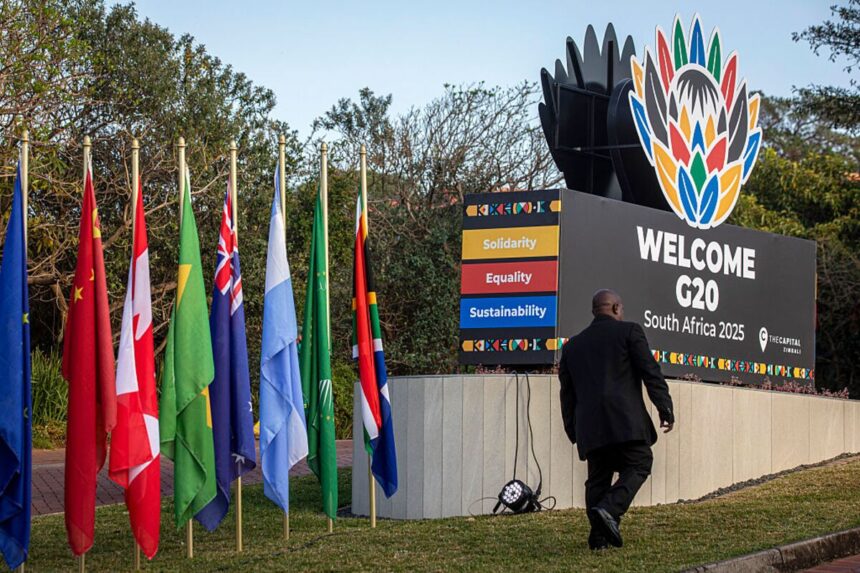The atmosphere in Venice’s historic Arsenale naval complex is thick with tension as finance ministers from the world’s leading economies gather under the shadow of President Trump’s escalating global trade conflict. What should have been discussions about post-pandemic economic cooperation has instead become a crisis management session.
“We’re facing unprecedented economic volatility,” Germany’s Finance Minister Christian Lindner told me during a brief corridor exchange yesterday. “This is not just about tariffs anymore—this is about the fundamental rules of global commerce.”
The numbers paint a stark picture. Since the implementation of Trump’s 60% tariffs on Chinese goods and 25% on European products last month, global markets have shed nearly $2.4 trillion in value. The International Monetary Fund has already revised global growth projections downward by 0.8 percentage points for the coming year, with further adjustments likely.
What makes this G-20 meeting particularly consequential is the fracturing consensus among traditional allies. European and Asian delegates arrive united in opposition to American protectionism, but divided on how to respond. The French-led bloc favors immediate countermeasures, while German and Japanese representatives advocate for continued dialogue.
“We cannot allow a single administration to dismantle decades of economic integration,” said French Finance Minister Bruno Le Maire during yesterday’s opening session. His comments stood in stark contrast to U.S. Treasury Secretary Janet Yellen’s defense of what she termed “economic security measures.”
Walking through Venice’s narrow streets last night, I encountered protesters representing both sides of the debate. Outside my hotel, Italian manufacturing workers demanded protection from Chinese competition, while nearby, port workers warned that retaliatory tariffs would devastate shipping volume at Mediterranean terminals.
The real damage, according to World Trade Organization data released yesterday, isn’t simply in decreased trade volumes but in disrupted supply chains. An estimated 64% of global manufacturing now involves components crossing at least three borders before reaching consumers. Trump’s tariffs have created what one Japanese delegate called “economic shrapnel” affecting seemingly unrelated industries.
The European Commission’s economic assessment, shared confidentially with delegates and obtained by Mediawall, projects 780,000 European jobs at risk if the current tariff structure remains in place for one year. Small and medium enterprises, which lack multinational corporations’ ability to shift production across borders, face disproportionate impacts.
“We’re the collateral damage in this power struggle,” explained Sofia Martinelli, who runs a precision parts manufacturer outside Milan that supplies both American and Chinese companies. “Our margins can’t absorb these tariffs, but we can’t simply abandon customers we’ve worked with for generations.”
China’s response has been particularly concerning to financial markets. Beyond implementing mirror tariffs, Beijing has allowed the yuan to depreciate 7% against the dollar in what many analysts view as competitive devaluation. This morning, Singapore’s finance minister warned that currency tensions could trigger a dangerous new dimension to the conflict.
The technical working groups have been particularly focused on what Brazil’s delegate termed “sanction contagion“—how targeted trade measures inevitably spread to neutral countries. South Korea, which maintains key supplier relationships with both Chinese and American technology firms, estimates a 2.3% GDP contraction if forced to choose sides in the dispute.
India’s position has emerged as particularly significant. As both the world’s fifth-largest economy and a strategic counterweight to China in Asia, Finance Minister Nirmala Sitharaman has positioned her country as a potential mediator. “We understand both protection of domestic industries and the necessity of open markets,” she told assembled delegates this morning. “But economic nationalism helps no one in the long term.”
The most productive discussions have occurred in closed-door sessions focused on de-escalation mechanisms. Treasury Secretary Yellen has reportedly signaled flexibility on implementation timelines, while Chinese representatives have proposed sector-specific exemptions for medical supplies and climate technologies.
What’s notably absent is any substantial conversation about the WTO’s role in resolving the dispute. With its appellate body still effectively paralyzed after years of U.S. opposition to appointing new judges, the organization lacks enforcement capacity precisely when it’s most needed.
“We’re witnessing the consequences of institutional erosion,” explained Roberto Azevêdo, former WTO Director-General, when I reached him by phone yesterday. “When countries lose faith in multilateral solutions, they revert to bilateral power plays. Everyone loses.”
The Bank for International Settlements released troubling data during today’s sessions showing capital flight from emerging markets accelerating as investors seek safe havens. This secondary effect threatens to transform a trade dispute between wealthy nations into a financial crisis for vulnerable economies.
As finance ministers prepare their communiqué, the challenge remains bridging fundamentally different views of global economic governance. The question hanging over Venice’s ancient shipyards isn’t simply about resolving this particular trade dispute, but whether the G-20’s collaborative approach to economic management can survive in an era of resurgent nationalism.
Standing on the Arsenale’s waterfront tonight, watching delegates depart in water taxis across the lagoon, the historical parallels are impossible to ignore. Venice once thrived as a trading empire at the crossroads of East and West before declining amid rising protectionism and new trade routes. Today’s finance ministers would do well to remember those lessons as they navigate our current economic crossroads.






